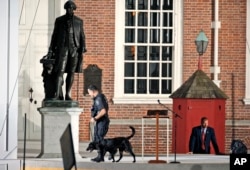As the grandson of one president and the son-in-law of another, he observed firsthand the history made during the administrations of President Dwight Eisenhower and President Richard Nixon.
But even though David Eisenhower spent a fair portion of his life in the White House, he is most impressed with the history that surrounds him today in one of this city's most famous and recognizable landmarks: Independence Hall.
It’s not just an historic building in the town where he now works and lives, he explains. It’s the embodiment of the American Revolution, the place where the country's leaders gathered to chart the path forward for a new nation.
“It is a celebration of America’s origins,” he told VOA in an interview on the University of Pennsylvania campus.
Hoping to make history
The Democratic National Convention this year is using the slogan Let’s Make History Again, a nod to the city's role in founding the United States in the 18th century.
“Philadelphia is important because it was the first national capitol of the United States,” explained Lee Arnold, director of collections at the Historical Society of Pennsylvania.
"Everything you know about the founding of this country happened here," he said. "The three crucial documents that are the legal basis for our country – the Declaration of Independence, the Articles of Confederation, the Constitution – all were written here. No one else can say that.”
The historical society owns early drafts of all three documents.
Housed under heavy glass protection and displayed under staff members' watchful eyes, those documents are part of the historical society’s contribution to PoliticalFest, a six-day celebration of history and politics that concluded Wednesday. It was designed to lure the DNC's tens of thousands of visitors not only to the Pennsylvania Convention Center but to six other sites scattered around the city.
Unlike Independence Hall, some institutions don’t necessarily top tourists' lists.
One that gets overlooked is the Library Company of Philadelphia, whose collections of important historical items include a book annotated by Thomas Jefferson, a lock of George Washington’s hair and a plaster mask of Abraham Lincoln made during his lifetime. Those presidential items are just some of the relics and rarities on display.
Arnold said he hoped the city's visitors would appreciate history beyond the convention hall: “I want everybody in Philadelphia, when they get on that plane" leaving the city, to be "smarter than when they got off it. I want them to learn something.”
Personal touch
Thanks to the historical society's unique collections, visitors also might leave knowing more about their personal histories.
“We are also one of the largest genealogical libraries in the country," Arnold said. "We don’t just concentrate on Pennsylvania; we collect genealogy for every state east of the Mississippi River.”
Among the many important family history documents is a small, finely preserved booklet Arnold eagerly showed off.
He gingerly turned to the first page as he described the booklet's importance. Handwritten in 1776, it is a lengthy extract from a journal, each page outlining the details and rigors of military life in colonial New York. The journal begins just over a month "after independence was declared,” Arnold added.
The letter, dated August 27, 1776, outlines the Battle of Long Island, in which American forces engaged the British military in what today is New York's borough of Brooklyn. The battle marked the beginning of major combat in the Revolutionary War.
The first sentence reads, “This morning before day, the camp was alarmed by an attack.”
The last page of the 240-year-old document bears the signature of Colonel Samuel Atlee, who provided his account of the conflict while serving under then-General Washington.
Samuel Atlee is this reporter’s ancestor, the brother of my fifth great grandfather, William Augustus Atlee.
“Not everyone can have a connection to where someone sat and wrote on a piece of paper about their experiences," Arnold said. "... It’s really wonderful.”
If you can personally feel history, this might be how.











